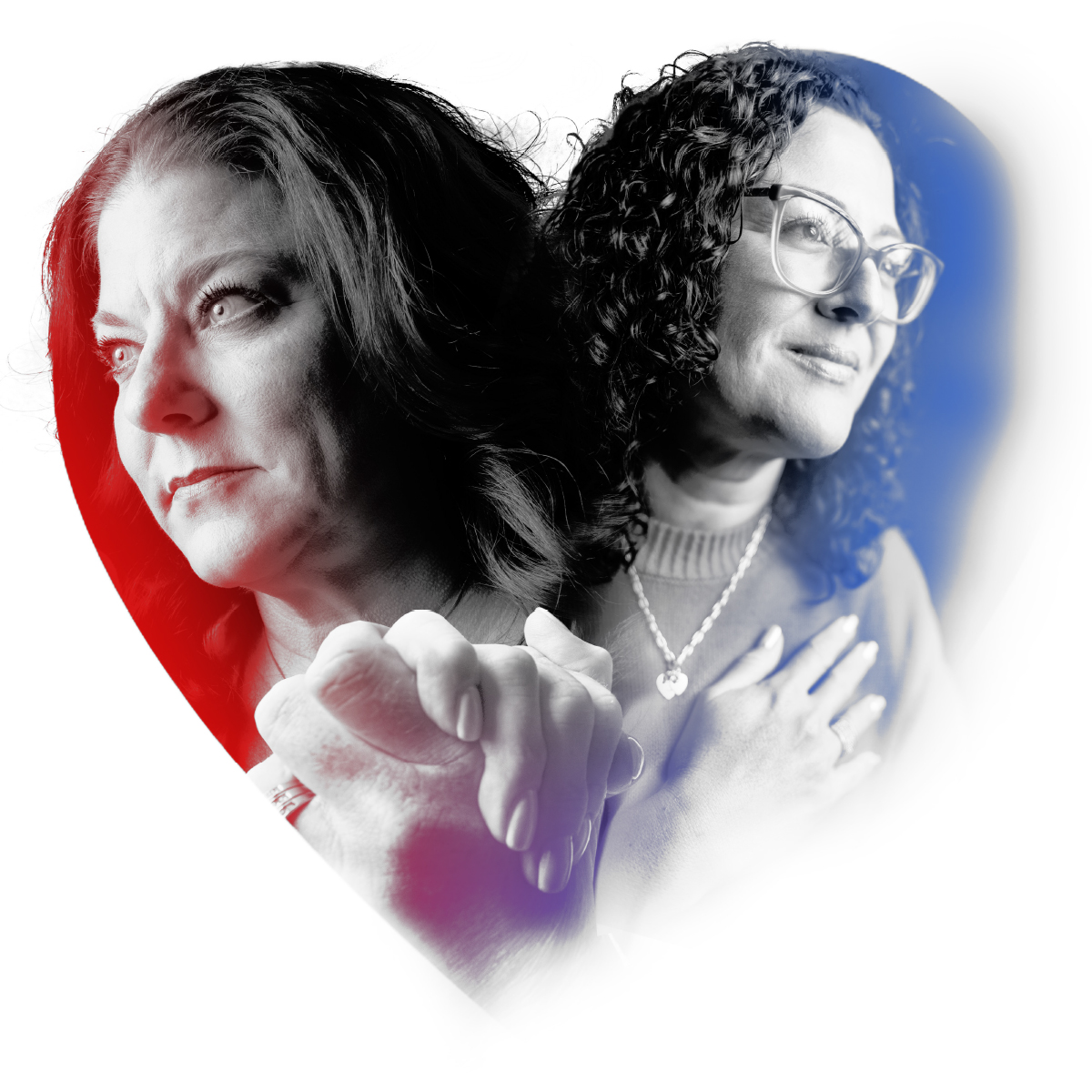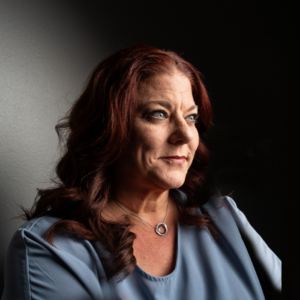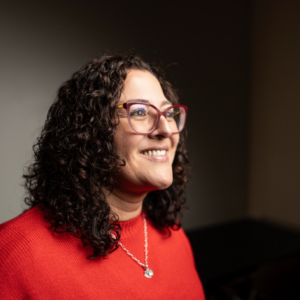Oh Well!
Heart to Heart
Karyn Hewett and Maggie Sigiani are two women on separate paths yet united by a common goal: a healthier heart.
- Heather Luxemburg

Karyn Hewett, a vibrant 52-year-old found herself inevitably caught in the whirlwind of life. As a hairstylist working 12-hour days, Karyn was immersed in a life that prioritized everyone but herself. Balancing marriage, motherhood, and work, her health took a backseat. Stress had become a constant companion, and the mental strain was palpable.
The pivotal moment arrived when her OBGYN diagnosed her with early hypertension, sounding the alarm about potential risks like stroke and heart attack. Looking back, she’s not surprised. “I was constantly agitated, dizzy and out of breath—plus, I was suffering from sleep apnea. I assumed it was anxiety or depression, so I started taking medication for those issues. It never even occurred to me that it could have been related to my health.”
Karyn’s revelation to high blood pressure came after years of silent progression, marked by subtle yet impactful symptoms. “My blood pressure always showed as high normal, but as a new mother, it wasn’t on the forefront of my mind. After I gained a lot of weight, the prehypertension tipped over to high blood pressure. Weight can cause so much stress on your body.” Hypertension, commonly known as high blood pressure, is a silent but insidious threat to one’s overall health. When left unmanaged, it can wreak havoc on the body, leading to severe complications. The condition strains arteries, increasing the risk of hardening and narrowing, restricting blood flow to vital organs and culminating in heart disease, stroke, and cardiovascular issues. Additionally, it places extra stress on the heart and kidneys, potentially resulting in heart failure and impaired waste filtration.
For women, in particular, hypertension manifests differently, often with subtle signs such as headaches, fatigue, nausea, or difficulty sleeping, making it challenging for women to recognize the importance of monitoring their blood pressure regularly. Regular check-ups, especially during key life stages like pregnancy and menopause, are crucial. Awareness of personal risk factors, such as family history, hormonal changes, and lifestyle choices, is equally important. By understanding these unique aspects, women can take proactive measures to prevent and manage hypertension, promoting not only their heart health but their overall well-being.
For Karyn, it became a wake up call to prioritize her health, both mental and physical.“I’m now taking medication for my blood pressure, and I’ve adjusted my eating habits. I still have a hectic schedule, but I try to find time to stay active. Thankfully, my husband is a cycling enthusiast, and my biggest fan and motivator. It has been difficult, but I’m moving in the right direction.”
Wellness Counts
1 in 3
women’s deaths are caused by cardiovascular disease.
SOURCE: National Alliance on Mental Illness
45%
of females 20 years and older are living with some form of cardiovascular disease.
SOURCE: National Alliance on Mental Illness
50%
of women entering pregnancy in the United States have good heart health.
SOURCE: National Alliance on Mental Illness
52%
of high blood pressure deaths, otherwise known as hypertension or the “silent killer,” are in women.
SOURCE: National Alliance on Mental Illness
Today, Karyn advocates daily about the significance of reliable sources and personal connections in obtaining accurate information. She implores, “Don’t wait for an official diagnosis. As soon as you hear ‘high normal’ or ‘prehypertension’, do something. My diagnosis took time, and I think about all the years that I was at risk of having a stroke or a heart attack. Being overweight for so long damaged my body in many ways. I’m still working on my life changes, but with my support cheerleaders and a positive mindset, I’ve made strides toward a healthier future.”
While Karyn navigated the complexities of hypertension, Maggie Sigiani wasn’t as lucky. Maggie’s journey began unexpectedly in her forties, a time when she was actively pursuing a healthier lifestyle for herself and her family. Amidst a seemingly normal day, an argument with her husband triggered a catalyst within her—a heart attack. However, like many women, she didn’t know it at the time.
Maggie’s heart attack wasn’t characterized by the classic chest pain. Instead, she felt an unusual pressure, an ache in her upper abdomen that persisted through the night. “It was a sensation I had never felt in my life,” she shares.
Despite the her strange symptoms and growing pain, Maggie initially dismissed the problem, assuming it was stress-related. But the following day, Maggie’s condition took a perilous turn, as her symptoms continued to escalate. “I was in so much pain, I couldn’t think. I was having stomach pain, and I couldn’t stop burping. My jaw was hurting, my head was spinning and my arms were dormant. That was when I realized that what I was experiencing was very serious, and I went to the hospital.”
What followed was a tumultuous journey of discovery. Maggie was diagnosed with Broken Heart Syndrome, or cardiomyopathy, a condition where extreme stress or sorrow can mimic the symptoms of a heart attack.

“What makes my case different, however, is that my broken heart syndrome triggered an actual heart attack. Every single doctor that came to the room told me to thank God, because at my age, it was a miracle that I survived.” This revelation not only altered her perception of her health but unraveled a familial thread of heart-related issues, urging her to advocate for proactive heart health in her family. She says, “I discovered that my grandmother died from broken heart syndrome, and we never knew—she was 92, so we never thought anything about it. Her mother died at age 42 from the same condition. Plus, my mother had open heart surgery. Now, the whole family is more aware of the risk.” The following years consisted of constant check ups, EKG tests, medications, and lots of grace. Maggie and her family honed their eating habits, opting for frequent home-cooked meals, with a heavier focus on vegetables. “I was actively trying to become healthier, in every aspect of my life.”
But for Maggie, the heavy lifting was not all physical. The mental and emotional toll of surviving a heart attack is often underestimated. Post-attack, Maggie faced not only physical rehabilitation but also a mental and emotional journey. The fear of a recurring event lingered, awakening anxieties in the quiet of the night. “It was traumatic. I was waking up in the middle of the nights, terrified it would happen again. With every stomach ache or slight pain, I thought I was having another attack.” However, Maggie confronted these fears head-on, seeking solace in her faith and embracing therapy to navigate the mental aftermath of her ordeal.
Now an advocate for regular check-ups, Maggie emphasizes the importance of not dismissing unfamiliar symptoms. “If you feel like something is wrong, trust your gut. Don’t assume it’s nothing. I swore I was OK, despite what I was experiencing. I could have lost my life.” Maggie’s story urges women to prioritize their heart health, cherish the present, and forge connections that nourish the soul.
According to the American Heart Association, heart disease is the leading cause of death for women, underscoring the need for increased awareness, prevention, and intervention strategies. Heart disease claims more lives than all forms of cancer combined—more than 60 million women are living with some form of heart disease. It’s a prevalent and pervasive health issue that affects women across various demographics. Karyn and Maggie’s journeys are reminders that behind these statistics lie deeply personal struggles, and every woman’s heart deserves the attention it often doesn’t receive. Their experiences highlight the importance of recognizing the distinct symptoms that women may encounter and the need for proactive measures. Beyond individual struggles, the collective call is clear: women’s heart health demands attention and understanding.

Managing Your Risk
Several factors contribute to heart disease in women, and understanding these risk factors is crucial for early detection and effective prevention. Some of the key risk factors include:
Age: The risk of heart disease increases with age, and women over 50, especially those who have undergone menopause, face a higher likelihood.
Family History: A family history of heart disease can significantly elevate a woman’s risk. Genetic factors play a role in the development of cardiovascular conditions.
Hormonal Changes: Hormonal changes associated with pregnancy, menopause, and the use of certain hormonal therapies can impact heart health. For instance, conditions like preeclampsia during pregnancy may increase the risk of future heart disease.
Lifestyle Factors: Unhealthy lifestyle choices, such as poor diet, lack of physical activity, smoking, and excessive alcohol consumption, contribute to the development of heart disease. These factors are often modifiable through proactive changes in behavior and habits.
Medical Conditions: Conditions like diabetes, high blood pressure, and high cholesterol can significantly increase the risk of heart disease in women. Regular monitoring and management of these conditions are essential components of heart health.
Psychosocial Factors: Stress, depression, and social isolation can also impact heart health. Addressing mental health and maintaining strong social connections are important aspects of overall well-being.




